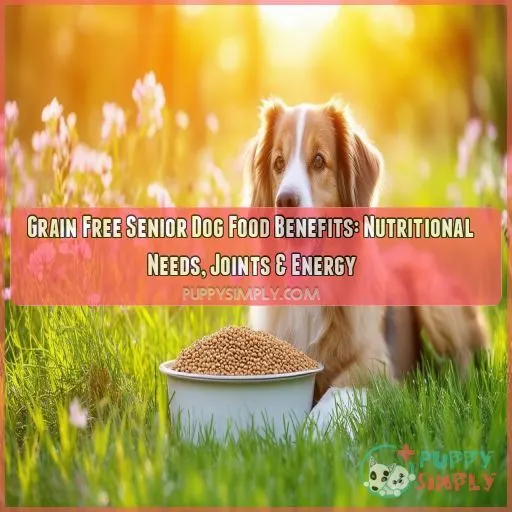This site is supported by our readers. We may earn a commission, at no cost to you, if you purchase through links.

Senior dogs have different dietary requirements to younger dogs, and choosing the right food can help them live a happy and healthy life.
One option is grain-free senior dog food, which can offer benefits such as nutritional adjustments, joint health support, and energy sources.
This article will explore the advantages of grain-free senior dog food and provide guidance on choosing the best option for your furry friend.
Table Of Contents
- Key Takeaways
- Do Senior Dogs Need Grain-Free Dog Food?
- Benefits of Grain-Free Dog Food for Senior Dogs
- Possible Drawbacks of Grain-Free Dog Food for Senior Dogs
- Choosing the Best Grain-Free Senior Dog Food
- Health Conditions and Grain-Free Senior Dog Food
- Frequently Asked Questions (FAQs)
- Should I feed my senior dog grain free dog food?
- Is there a benefit to grain free dog food?
- Do vets recommend grain-free dog food?
- Is senior dog food really necessary?
- What are the benefits of grain-free dog food for senior dogs?
- Are there any drawbacks to grain-free food for older dogs?
- How do I choose the best grain-free senior dog food?
- Can grain-free senior dog food help with health conditions?
- Do senior dogs need grain-free food?
- Conclusion
Key Takeaways
- As dogs age, their nutritional needs evolve, and senior dog food is tailored to support their changing bodies.
- Grain-free senior dog food offers benefits like nutritional adjustments, joint health support, and energy management.
- Consult your veterinarian and consider your dog’s unique needs, size, and breed when choosing the best grain-free option.
- A gradual transition to new food is key – take it slow and steady to avoid tummy troubles.
Do Senior Dogs Need Grain-Free Dog Food?
As your furry friend enters their golden years, you might wonder if their diet should evolve to meet their changing needs. Senior dogs have unique nutritional requirements, and you may have heard about the benefits of grain-free dog food. But is it the right choice for your aging companion?
The answer isn’t a simple yes or no. While grain-free diets can offer advantages, they aren’t necessarily a one-size-fits-all solution for senior dogs. Let’s explore this topic further to help you make informed decisions about your senior dog’s nutrition.
Benefits of Grain-Free Dog Food for Senior Dogs
Grain-free senior dog food offers benefits that cater to the unique needs of aging dogs. This includes nutritional adjustments, joint health support, and energy sources to help manage health conditions and promote overall well-being, ensuring your furry friend stays happy and healthy during their golden years.
Nutritional Adjustments
As your dog ages, their nutritional needs change, and a senior dog diet can help manage these adjustments. Here are some key benefits of grain-free senior dog food when it comes to nutritional adjustments:
- High-quality protein sources: Grain-free senior dog food often provides higher amounts of protein from quality sources, supporting lean muscle mass.
- Caloric balance: These diets offer an appropriate balance of calories from fat and protein, helping with weight management.
- Additional nutrients: They may include added nutrients like omega-3 fatty acids to support your dog’s overall health and well-being.
- Healthy skin and coat: Grain-free senior dog food often contains nutrients like Vitamin A and linoleic acid to promote a shiny coat and healthy skin.
- Overall health: By meeting your senior dog’s changing nutritional needs, grain-free diets can help them maintain their overall health and energy levels.
Joint Health
As your dog ages, joint health becomes increasingly important.
Senior dog food can help support their joints and mobility.
Look for formulas with added joint supplements like glucosamine hydrochloride and chondroitin sulfate, which can help reduce arthritis pain and improve your dog’s overall mobility.
Omega-3 fatty acids are another key ingredient in senior dog food, promoting joint health and reducing inflammation.
These supplements, combined with regular dog exercise, can help your senior dog stay active and comfortable in their golden years.
Energy Sources
As your dog ages, their energy levels may decrease, and they may become less active. Senior dog food can help manage these changes by providing appropriate caloric balance from fat and protein.
Possible Drawbacks of Grain-Free Dog Food for Senior Dogs
While grain-free senior dog food offers benefits, it’s important to be aware of potential drawbacks. Here are some considerations:
- Digestive Issues: Some senior dogs may experience digestive problems when switching to grain-free food. This could include constipation or diarrhea.
- Nutritional Imbalance: Grains provide essential nutrients like carbohydrates, fiber, and B vitamins. Removing grains from your dog’s diet may lead to nutritional deficiencies if not properly replaced.
- Potential Risks for Puppies: While we’re focusing on senior dogs, it’s worth noting that grain-free diets have been linked to potential health risks in puppies, including developmental issues and nutritional imbalances.
- Limited Research: The long-term effects of grain-free diets on senior dogs aren’t yet fully understood. More research is needed to determine the full scope of benefits and risks.
- Dog Food Allergies: While grains aren’t a common allergen for dogs, some individual dogs may have specific grain allergies or sensitivities. In such cases, a grain-free diet could be beneficial but consult a veterinarian first.
Choosing the Best Grain-Free Senior Dog Food
When choosing the best grain-free senior dog food, it’s important to consult with your veterinarian first.
They can evaluate your dog’s health, diagnose any problems, and recommend a formula that addresses their specific needs, such as weight management or joint health.
Consider your dog’s size or breed when making a decision, and remember to switch them slowly to the new food to avoid any digestive issues.
Consult With Your Veterinarian
When choosing the best grain-free senior dog food, it’s important to consult with your veterinarian. They can provide valuable insights and recommendations based on your dog’s unique health needs and lifestyle.
| Senior Dog Food Choice | Health Concerns | Lifestyle Factors |
|---|---|---|
| Vet-Recommended Formula | Age-Related Conditions | Daily Exercise Routine |
| Joint Health Support | Food Allergies | Socialization Needs |
| Weight Management | Digestive Issues | Travel or Boarding |
| Dental Disease Prevention |
Your veterinarian can evaluate your dog’s overall health, diagnose any underlying issues, and suggest specific senior dog food formulas that cater to their needs.
Consider Your Dog’s Size or Breed
When choosing the best grain-free senior dog food, it’s important to think about your dog’s size or breed.
Different breeds have different nutritional needs, and the right food can help support your dog’s health and well-being.
For example, large breeds may require joint support, while small breeds might need calorie-controlled options to maintain a healthy weight.
Senior dog food recommendations should factor in your dog’s unique characteristics and lifestyle.
Transitioning to the New Food
When switching to a new senior dog food, remember that slow and steady wins the race.
Gradual change is key to a smooth switch, so mix a small amount of the new food with their current diet and gradually increase the proportion over 7-10 days.
This gives their digestive system time to adjust and helps prevent tummy troubles.
Timing and patience are important, so be consistent with feeding schedules and don’t rush the process.
Health Conditions and Grain-Free Senior Dog Food
Senior dogs may have specific health conditions that can be managed with the right diet. For instance, dental disease can be improved by feeding your dog senior dry food with a specific kibble shape, size, and texture to reduce plaque buildup. If your dog has arthritis, look for senior dog food with added ingredients like glucosamine hydrochloride, chondroitin sulfate, and long-chain omega-3 fatty acids. These ingredients can help support joint health and mobility. Additionally, if your dog has kidney disease, a high-quality senior food with low protein may be beneficial.
It’s important to note that not all senior dogs will need a diet change. Consult with your veterinarian to determine if your dog’s current food is meeting their nutritional needs and to discuss any specific health conditions that may benefit from a therapeutic diet.
Frequently Asked Questions (FAQs)
Should I feed my senior dog grain free dog food?
Consult your veterinarian. While some vets recommend a low-grain diet, others advocate for grain-free options, especially for adult dogs. The right choice depends on your dog’s health, breed, and specific needs.
Is there a benefit to grain free dog food?
Grain-free dog food can improve your dog’s skin and coat, leaving them shiny and healthy. It can also reduce gas, improve breath, and increase energy levels by avoiding blood sugar spikes and crashes.
Do vets recommend grain-free dog food?
It depends on your dog’s needs. Vets may recommend grain-free diets if your dog has a grain allergy, but opinions vary. It’s important to consult your vet for advice.
Is senior dog food really necessary?
Senior dog food is like a trusty walking stick—it can help your dog navigate the challenges of aging. While it’s not essential, it provides specific nutrition for older dogs, supporting weight management and overall health.
What are the benefits of grain-free dog food for senior dogs?
Grain-free senior dog food provides lean protein to support muscle mass and healthy body weight. It’s also hypoallergenic and anti-inflammatory, helping to manage osteoarthritis and food sensitivities.
Are there any drawbacks to grain-free food for older dogs?
A grain-free diet may not be suitable for less active senior dogs as it can lead to weight gain. This is because grain-free food is often rich in protein and energy, which can be unnecessary for dogs with lower activity levels.
How do I choose the best grain-free senior dog food?
Consult your vet before making any changes to your dog’s diet. They can recommend a senior dog food formula to address specific needs, like weight management or joint health.
Can grain-free senior dog food help with health conditions?
Yes, grain-free senior dog food can help with certain health conditions. It’s been shown to improve dental hygiene, reducing bad-smelling bacteria and preventing canine halitosis. It can also help dogs with food sensitivities, as it’s free of common canine allergens like corn, wheat, soy, and grains.
Do senior dogs need grain-free food?
Senior dogs may benefit from grain-free food, especially if they’ve food sensitivities or allergies. Consult your veterinarian about your dog’s specific needs and consider the potential link between grain-free diets and heart disease in dogs.
Conclusion
As your four-legged friend enters their golden years, their dietary needs evolve.
Grain-free senior dog food offers a host of benefits, from nutritional adjustments to support joint health and energy levels.
While there may be some drawbacks, choosing a grain-free option can be advantageous for your dog’s health, especially with the right guidance.
Remember to consult your veterinarian and consider your dog’s unique needs, size, and breed.











